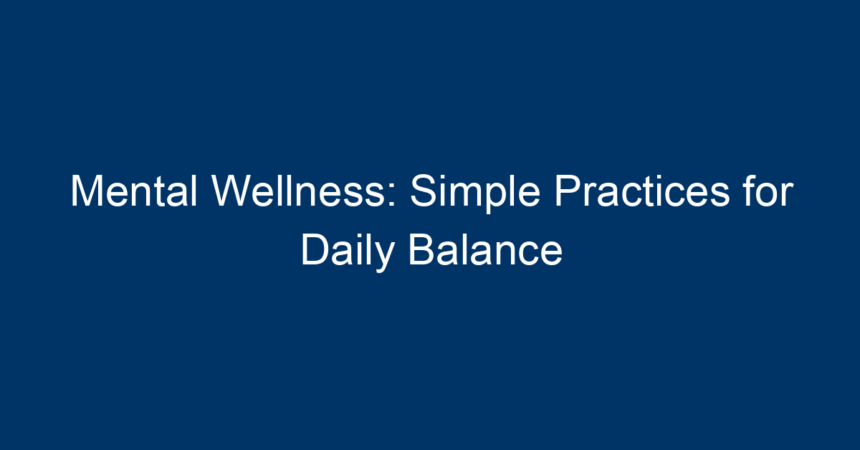In today’s fast-paced world, the pursuit of mental wellness has become more crucial than ever. With the constant barrage of stressors from work, relationships, and societal pressures, maintaining a balanced mental state can feel overwhelming. However, fostering mental wellness is not only achievable; it can also lead to a more fulfilling and vibrant life. In this article, we’ll explore simple daily practices that can promote mental wellness, helping you find balance and peace amidst life’s chaos.
Understanding Mental Wellness
Before diving into specific practices, it’s essential to understand what mental wellness means. Mental wellness involves more than just the absence of mental disorders; it encompasses emotional, psychological, and social well-being. It influences how we think, feel, and act, directly impacting our ability to handle stress, relate to others, and make choices.
The Importance of Mental Wellness
Prioritizing mental wellness can lead to numerous benefits, including:
- Improved emotional resilience: Better equipped to handle life’s challenges.
- Enhanced relationships: Fostering healthier connections with family, friends, and colleagues.
- Increased productivity: A clear mind can significantly boost focus and efficiency.
- Overall happiness: Cultivating a positive mindset leads to enhanced life satisfaction.
Simple Daily Practices for Mental Wellness
Incorporating small, manageable practices into your routine can significantly influence your mental wellness. Here are some effective methods to consider:
1. Mindfulness Meditation
Mindfulness meditation has gained popularity for its positive effects on mental wellness. Taking just a few minutes each day to practice mindfulness can help clear your mind and reduce anxiety.
-
How to Start: Find a quiet space, sit comfortably, and focus on your breath. If your thoughts drift, gently redirect your attention back to your breathing.
- Benefits: Regular mindfulness practice can lower stress, improve concentration, and enhance emotional regulation.
2. Physical Exercise
Physical activity is not only beneficial for your body; it plays a vital role in mental wellness too. Exercise releases endorphins, the body’s natural mood lifters.
-
Types of Exercise: Whether it’s yoga, running, dancing, or even a brisk walk, find an activity that you enjoy. Aim for at least 30 minutes of moderate exercise most days.
- Benefits: Regular exercise can reduce symptoms of anxiety and depression, improve sleep, and boost overall self-esteem.
3. Journaling
Journaling serves as an effective outlet for expressing emotions and tracking personal growth.
-
How to Start: Set aside 10-15 minutes daily to write. Focus on your thoughts, feelings, or even gratitude lists.
- Benefits: Journaling can help clarify thoughts, manage anxiety, and enhance self-reflection, leading to improved mental wellness.
4. Building a Support Network
A robust support system can significantly enhance your mental wellness. Surrounding yourself with understanding friends and family allows you to share experiences and emotions without judgment.
-
How to Cultivate Relationships: Dedicate time to connect with loved ones. Regular check-ins through calls, texts, or meet-ups can strengthen bonds and provide emotional support.
- Benefits: A strong support network can improve your resilience and provide a safe space for venting and sharing.
5. Establishing a Routine
A structured daily routine can provide stability and predictability, promoting mental wellness.
-
How to Create One: Develop a daily schedule that includes time for work, exercise, relaxation, and personal interests. Ensure your routine includes regular breaks to avoid burnout.
- Benefits: A consistent routine helps manage time effectively, leading to reduced stress and a greater sense of control over your day.
6. Digital Detox
In our technology-driven world, constant exposure to screens can negatively impact mental wellness. Taking breaks from digital devices can rejuvenate your mind.
-
How to Implement a Detox: Aim to unplug for specific periods each day. Consider setting aside an “unplugged hour” before bed.
- Benefits: Reducing screen time can lessen feelings of anxiety and improve sleep quality, enhancing overall mental wellness.
7. Practice Gratitude
Focusing on gratitude can shift your mindset from negativity to positivity. Acknowledging what you’re thankful for fosters a more optimistic outlook.
-
How to Practice: Keep a gratitude journal, jotting down three things you’re thankful for each day, or share your gratitude with others during conversations.
- Benefits: Practicing gratitude has been associated with increased life satisfaction and reduced symptoms of depression.
8. Engage in Creative Activities
Engaging in creative outlets serves as a wonderful way to explore your emotions and relieve stress.
-
Types of Activities: Whether it’s painting, crafting, writing, or dancing, find an artistic pursuit that resonates with you.
- Benefits: Creativity fosters self-expression and can provide a sense of accomplishment, positively impacting mental wellness.
9. Invest in Nutrition
What we eat can significantly affect our mental state. A balanced diet rich in nutrients supports brain health.
-
Nutritional Tips: Incorporate foods like fruits, vegetables, whole grains, and omega-3 fatty acids. Stay hydrated and limit processed foods and sugars.
- Benefits: A healthy diet can improve mood, boost energy levels, and enhance cognitive function, all of which contribute to better mental wellness.
10. Seek Professional Help
It’s essential to remember that seeking help is a sign of strength, not weakness. If you struggle with persistent feelings of sadness or anxiety, consulting with a mental health professional can provide invaluable support.
-
When to Seek Help: If daily activities become challenging, or if you experience feelings of hopelessness, reaching out for professional guidance can be a crucial step.
- Benefits: Therapy and counseling offer tools to manage mental health, allowing for a deeper understanding of oneself and healthier coping strategies.
Conclusion: Actionable Insights for Daily Balance
Achieving mental wellness doesn’t require drastic changes; small, consistent actions can create a profound impact. By integrating practices like mindfulness, exercise, journaling, and fostering relationships into your daily routine, you can cultivate a balanced mental state.
Remember, mental wellness is a journey, not a destination. Embrace each step you take towards better mental wellness, and be kind to yourself along the way. Every small effort contributes to a healthier, happier you.
As you start your journey towards mental wellness, reflect on which practices resonate with you the most. Try to incorporate one or two into your daily life and observe how these small changes enhance your overall well-being. Prioritize your mental wellness—after all, it’s the foundation for a fulfilling life.




